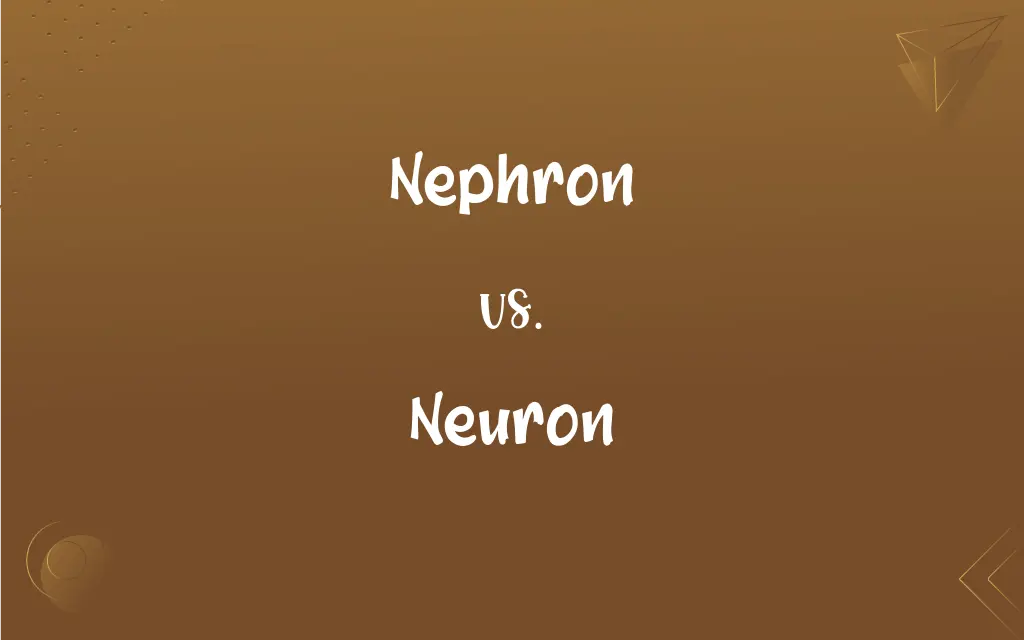Nephron vs. Neuron: What's the Difference?
Edited by Harlon Moss || By Janet White || Published on January 24, 2024
Nephron is the functional unit of the kidney involved in urine formation. Neuron is a cell of the nervous system that transmits signals through electrical and chemical processes.

Key Differences
A nephron is the basic structural and functional unit of the kidney, responsible for filtering blood and producing urine. In contrast, a neuron is a specialized cell in the nervous system that transmits information through electrical and chemical signals.
Nephrons play a crucial role in maintaining the body's fluid balance and removing waste products, using a complex process of filtration, reabsorption, and secretion. Neurons, on the other hand, are involved in receiving sensory input, processing information, and controlling muscle movements.
Each kidney contains about a million nephrons, consisting of a renal corpuscle and renal tubule, which work together to filter blood. Neurons consist of a cell body, dendrites, and an axon, forming extensive networks to communicate within the brain and throughout the body.
Nephrons adjust the concentration of salts and other substances in the blood, an essential function for homeostasis. Neurons, through their synaptic connections, are integral to cognitive functions like memory, learning, and decision-making.
Diseases affecting nephrons can lead to kidney failure, requiring dialysis or transplantation. Neurological disorders, affecting neurons, can lead to conditions like Alzheimer's, Parkinson's, or multiple sclerosis.
ADVERTISEMENT
Comparison Chart
Primary Function
Filtration and urine production
Transmission of nerve impulses
Location
Kidneys
Nervous system (brain, spinal cord, nerves)
Structural Components
Glomerulus, Bowman's capsule, renal tubule
Cell body, dendrites, axon
Related Disorders
Kidney diseases (e.g., nephritis, kidney stones)
Neurological disorders (e.g., epilepsy, ALS)
Role in Body
Fluid and electrolyte balance, waste removal
Sensory processing, muscle control, cognition
ADVERTISEMENT
Nephron and Neuron Definitions
Nephron
The basic unit of kidney function, involving processes like filtration and reabsorption.
Each nephron in the kidney plays a vital role in maintaining the body's internal environment.
Neuron
A fundamental component of the brain and nervous system for signal transmission.
Research on neurons has advanced our understanding of learning and memory.
Nephron
The kidney's filtration device, crucial for regulating body fluids.
The nephron's ability to concentrate urine is vital for water conservation in the body.
Neuron
The basic building block of the nervous system, essential for communication.
Example: Each neuron has the capacity to form thousands of synaptic connections.
Nephron
A microscopic structure in the kidneys that filters blood and forms urine.
The efficiency of nephrons in filtering blood ensures the removal of toxins from the body.
Neuron
A nerve cell that transmits electrical and chemical signals in the body.
Example: Neurons in the brain form complex networks for processing information.
Nephron
A tiny, tubular structure in the kidney essential for urine formation.
Damage to nephrons can lead to serious kidney disorders and impaired detoxification.
Neuron
A cell specialized in carrying messages throughout the nervous system.
Example: Sensory neurons relay information from the senses to the brain.
Nephron
A kidney component performing blood filtration and urine production.
Scientists study nephrons to understand kidney diseases and develop treatments.
Neuron
An electrically excitable cell that processes and transmits information.
Example: Neurons in the spinal cord help coordinate movement and reflex actions.
Nephron
The functional excretory unit of the vertebrate kidney that regulates the amount of water in the body and filters wastes from the blood to produce urine.
Neuron
Any of the impulse-conducting cells that constitute the brain, spinal column, and nerves in vertebrates, consisting of a nucleated cell body with one or more dendrites and a single axon.
Nephron
(anatomy) The basic structural and functional unit of the kidney, which filters the blood in order to regulate chemical concentrations, and thereby produces urine.
Neuron
A similar impulse-conducting cell in invertebrates.In both senses also callednerve cell.
Nephron
Any of the small tubules that are the excretory units of the vertebrate kidney
Neuron
(cytology) A cell of the nervous system, which conducts nerve impulses; consisting of an axon and several dendrites. Neurons are connected by synapses.
Neuron
(zoology) A nervure of an insect's wing.
Neuron
(artificial intelligence) an artificial neuron mathematical function serving as an essential unit of an artificial neural network
Neuron
The brain and spinal cord; the cerebro-spinal axis; myelencephalon.
Neuron
The characteristic specialized cell that is part of the nervous system, serving to conduct electrical impulses to and from the brain, and also between other parts of the body, and composed of a main cell body, the axon, with a varying number of processes of varying length, the dendrites; a nerve cell. The movement and behavior of higher animals depends on the signals tranmsitted by such nerve cells.
Neuron
A cell that is specialized to conduct nerve impulses
FAQs
How many nephrons are in a human kidney?
Each human kidney contains approximately one million nephrons.
Can nephrons regenerate?
Nephrons have limited regenerative capacity; damage can be irreversible, leading to kidney disease.
How do neurons communicate?
Neurons communicate via synaptic transmission, sending signals through neurotransmitters.
What is a neuron?
A neuron is a nerve cell that transmits information through electrical and chemical signals.
What are the parts of a neuron?
A neuron consists of a cell body, dendrites, and an axon.
What functions do nephrons perform?
Nephrons filter blood, remove waste, and balance electrolytes and water in the body.
How are neurons classified?
Neurons are classified based on function (sensory, motor, interneurons) and structure.
What diseases affect nephrons?
Diseases like nephritis, polycystic kidney disease, and diabetes can affect nephrons.
What is a nephron?
A nephron is the functional unit of the kidney that filters blood to produce urine.
What happens if nephrons are damaged?
Damage to nephrons can result in kidney disease, potentially leading to kidney failure.
Can lifestyle impact nephron health?
Yes, diet, hydration, and avoiding toxins can help maintain nephron health.
Are nephron disorders hereditary?
Some nephron disorders, like polycystic kidney disease, have a genetic component.
Can learning new things change neurons?
Yes, learning can strengthen synaptic connections and even form new ones in neurons.
What is the role of neurons in memory?
Neurons in specific brain areas, like the hippocampus, are crucial for forming memories.
How do neurons affect mood and emotions?
Neurons, especially in the limbic system, play a key role in regulating mood and emotions.
How do nephrons control blood pressure?
Nephrons regulate blood pressure by controlling fluid balance and releasing hormones.
What's the lifespan of a neuron?
Neurons can live as long as the organism, often several decades in humans.
Do neurons multiply or grow new ones?
Neurons generally do not multiply in adults; however, some brain regions can grow new neurons.
What are neurodegenerative diseases?
Neurodegenerative diseases, like Alzheimer's, affect neurons, leading to cognitive decline.
What is dialysis, and how does it relate to nephrons?
Dialysis is a treatment for kidney failure that performs the filtering function of nephrons.
About Author
Written by
Janet WhiteJanet White has been an esteemed writer and blogger for Difference Wiki. Holding a Master's degree in Science and Medical Journalism from the prestigious Boston University, she has consistently demonstrated her expertise and passion for her field. When she's not immersed in her work, Janet relishes her time exercising, delving into a good book, and cherishing moments with friends and family.
Edited by
Harlon MossHarlon is a seasoned quality moderator and accomplished content writer for Difference Wiki. An alumnus of the prestigious University of California, he earned his degree in Computer Science. Leveraging his academic background, Harlon brings a meticulous and informed perspective to his work, ensuring content accuracy and excellence.































































